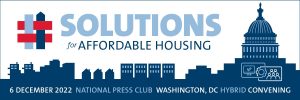
- This event has passed.
Solutions for Affordable Housing
December 6, 2022
Event Navigation

On December 6, 2022, the National Housing Conference hosted its Solutions for Affordable Housing convening at the National Press Club in Washington, D.C. This hybrid convening brought together a diverse group of housing professionals, policymakers, researchers, and advocates for a full day of engaging content that will inspire you to think of new ways to advance your organization’s mission while also considering the nation’s larger housing policy challenges. This year’s sessions included a discussion of the housing investments in the Inflation Reduction Act, creative solutions to addressing the housing supply deficit, housing finance strategies, special purpose credit programs, and what’s on the policy docket for 2023.
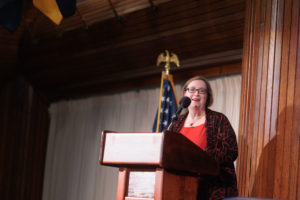
Keynote speaker: Julia Gordon, FHA CommissionerCommissioner Gordon opened the convening with a conversation about whats going on at FHA. She discussed initiatives at FHA’s such as multifamily work, CARES Act forbearance, and the strength of the FHA staff. |
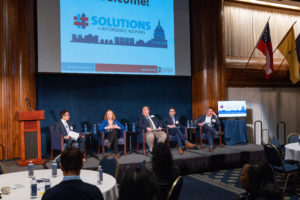
Panel: Housing Opportunities and the Inflation Reduction ActThe Inflation Reduction Act (IRA) is the federal government’s biggest investment to create clean energy jobs while stimulating American manufacturing and lowering health care costs. This panel delves into the new law’s direct spending and tax credits and how they may be used to preserve affordable housing and lower energy costs. Panelists discussed how the Greenhouse Gas Reduction Fund, High-Efficiency Electric Rebate Program, HOMES Rebate Program, and the New Energy Efficient Home Credit Extension can be leveraged with existing production and preservation tools at the federal and state level to create a blueprint for more climate-friendly and resilient communities. |

Panel: The Future Fannie Mae and Freddie Mac and Affordable HousingSince Director Sandra Thompson took the helm at the Federal Housing Finance Agency (FHFA), the Agency has made a series of announcements regarding the role of Fannie Mae and Freddie Mac (the Enterprises) in addressing equitable housing for underserved people and communities. In Director Thompson’s words, safety and soundness and equitable access to credit are not mutually exclusive. This panel discussed how the Enterprises can help “move the dial” housing for low- and moderate-income homebuyers and renters, and help close the racial homeownership gap. |
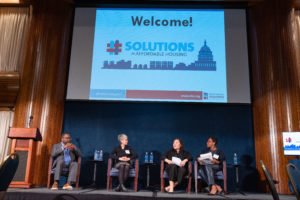
Panel: Appriasal ReformRecent news coverage makes clear the appraisal industry has failed to serve Black and White homeowners equally. In response to these continued inequities, the Administration has assembled a Property Appraisal and Valuation Equity (PAVE) Task Force. In March, The PAVE Task Force released its framework for improving the appraisal industry. Earlier this year, the National Fair Housing Alliance released an extensive report and provided recommendations to modernize the appraisal industry. Building on these ideas, this panel explored current efforts to reform the governance structure of the appraisal industry, ways to strengthen the guardrails against lawful discrimination, data needs, barriers to entry in the appraisal profession, and the identified gaps in compliance and enforcement. |
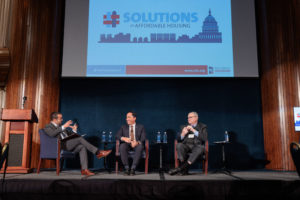
Panel: Fireside Chat with Mayor Gloria and Mayor KenneyModerator Luke Villalobos spoke with Mayor Todd Gloria and Mayor Jim Kenney to discuss the production of affordable housing, the preservation of naturally occurring affordable housing and the people at risk in their perspective cities. |
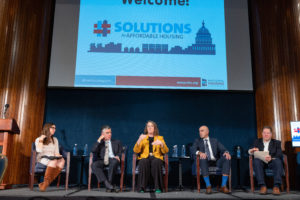
Panel: Housing and High Interest RatesRising shelter costs have had a significant impact on inflation. Since the onset of the pandemic, rents have risen more than 25 percent nationally. Some markets have seen rent increases averaging over 40 percent. Rising interest rates are also making affordable housing production and preservation more costly, limiting options for first-time homebuyers, refinancing older multifamily projects less feasible, and potentially dampening the appetite for tax credit equity as alternative investment returns become more attractive. The plenary discussion brought a panel of experts to talk about the impact of a rising interest rate environment on housing affordability, with a particular emphasis on how high interest rates will impact the construction pipeline for new housing. Panelists discussed how developers are navigating this economy, and what policies solutions lawmakers should be considering to counterbalance the negative consequences of the Federal Reserve’s monetary policy. |

Panel: Hot Topics in Multifamily Regulatory EnvironmentThroughout 2022, the lack of affordable housing inventory and substantial price increases have become a major concern for average Americans. Responding to this market dynamic, a number of regulatory and administrative actions have been put in motion to help address the current shortfall in housing production. A panel of experts will survey the landscape of regulatory actions that impact multifamily housing, including Average Income Test, Community Reinvestment Act, Global Minimum Tax, Fair Market Rents, HUD income limits, and placed in service deadlines. Attendees of this session learned the implications of regulatory change for affordable housing, what remains to be done, and how we should be thinking about the multifamily regulatory environment next year.
. |
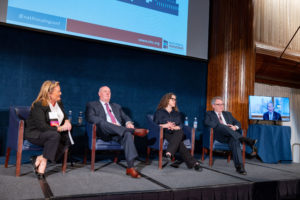
Panel: Navigating the Post-Pandemic Supply ChainThe pandemic has upended the global supply chain, from the shortage of baby formula to the ever-changing price of commodities like lumber, copper, and concrete. With housing supply and affordability inextricably linked to the cost and availability of materials, a deeper understanding of the elements of the supply chain will inform expectations and advocacy. This panel brought together experts from various aspects of the supply chain challenges to better understand the issue. Affordable housing developers discuss boots-on-the-ground experiences adjusting for the unexpected changes in local markets, and macro-economists will look at what we can expect from the housing supply chain in 2023. Panelists discussed administrative and legislative proposals to create a more resilient housing supply chain. . |

Panel: Special Purpose Credit Programs in PracticeUnder the 1974 Equal Credit Opportunity Act provision, Special Purpose Credit Programs serve as a tool intended to extend fair access to credit for historically underserved communities. HUD recently published guidance stating that SPCPs established in compliance with ECOA meets the standards set by the Fair Housing Act. This provides a unique opportunity for lenders and nonprofits to develop and design programs with a targeted approach to serve underserved consumers and combat the racial housing and wealth gaps. This panel brought together industry leaders from the CFPB, nonprofits, and housing innovators to explore and examine the implications of SPCPs in the current housing market. In addition, the panel will investigate how such programs can help improve access to fair housing opportunities for all borrowers. |
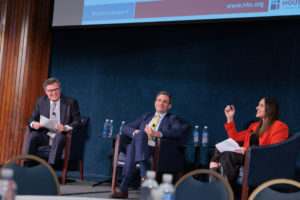
Panel: Bipartisan Housing SolutionsThis panel started off with a research presentation from the Bipartisan Policy Center on voter attitudes around housing. It then leads into a discussion on agreement on housing policy on both sides of the spectrum. |
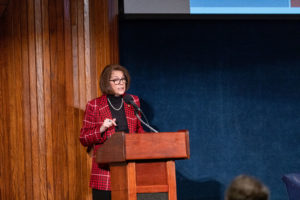
Keynote Speaker: Closing Remarks with Senator Catherine Cortes MastoSenator Catherine Cortes Masto of Nevada closed the convening with words about the importance of affordable housing. She discussed her work on stopping foreclosures and evictions, the funds her team provided after the American Rescue Plan, and how people in the affordable housing spaces need to be heard by Congress to create more affordable housing. |


